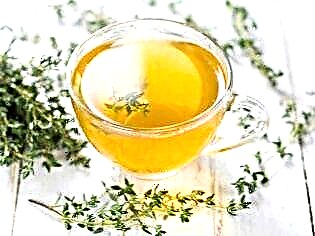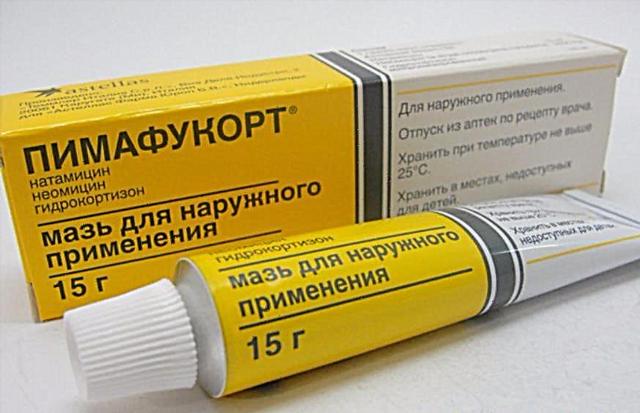
It is no secret that small children, due to the immaturity of their immunity, often get sick. Therefore, many parents try, without a good reason, not to give the kids pharmaceutical drugs, if the opportunity allows them to be replaced with folk remedies, including medicinal herbs. Today we will talk about thyme and how and from what it can help our children.


What it is
Thyme has an official name, which is better known to cooks and housewives - it is thyme, a fragrant semi-shrub, belonging to the number of essential oil representatives of the flora. In Russia, about 170 varieties of thyme grow, and the plant is rather unpretentious - it grows almost everywhere: in the forest, in the field, in the steppes and even on the slopes of rocks.
Due to its unique composition, thyme is in demand in official and alternative medicine, in cooking, cosmetology, in the canning and alcoholic beverage industry.

The plant is harvested in the summer during the period of active flowering. You should cut off the stems, leaves and capsules - seeds. Dry them in a cool, well-ventilated place out of direct sunlight. Ready raw materials are stored for about 2 years.
You will learn more about growing, collecting and harvesting by watching the following video.
Useful properties and contraindications
Such a widespread use of the plant is due to its rich composition. It contains a lot of essential oil containing thymol, flavonoids, organic acids and tannins. In addition, thyme contains fats, B vitamins, ascorbic acid (vitamin C), mineral salts, gums, saponins and special substances that impart bitterness.

Thyme essential oil is famous not only for its specific and strong aroma, but also for the fact that it contains approximately the same amount both in freshly cut plant stems and in already dried herbal raw materials.

Our ancestors in ancient times called thyme "divine herb" for its incredible ability to heal even from serious ailments. And also for the fact that it was he who was used as an incense in the performance of divine services. Thymol is now obtained from thyme - a substance that is used in the formulations of antihelminthic, disinfectants, and also painkillers.
For how thyme was used in antiquity, see the next video.
Traditional medicine has found the plant and additional use: it is used for the preparation of rubbing for diseases of the sciatic nerve, with radiculitis, as part of decoctions to normalize digestion, in ointments - to warm the chest with a strong cough as an expectorant.
Thyme is used topically for rashes, redness, dermatitis, wounds and skin ulcers.
As a general tonic, the stems and leaves of thyme are brewed in herbal tea.

The expressed anti-inflammatory effect of the plant is used in the treatment of diseases of the respiratory system in inhalation, decoctions for drinking. The diaphoretic effect that such a drink has has long been used by people to reduce fever and reduce the manifestations of fever.
As a sedative and mild hypnotic, thyme is added to tea and taken before bedtime with severe stress and various neurological disorders.

There are not so many contraindications to the use of thyme, but they are. First of all, this is the presence of problems with the heart and blood vessels (atrial fibrillation, ischemic disease, cardiosclerosis), atherosclerosis of the cerebral vessels, kidney and liver diseases, as well as functional insufficiency of the thyroid gland. Thyme is also contraindicated for gastritis, accompanied by high acidity, as well as for children with a tendency to allergies and children with an established diagnosis of bronchial asthma.
Application features for children
Officially, thyme is not recommended for children under the age of 3 years, however, in practice, the herb is quite successfully used externally for children from 1 year old:
- At the age of 1.5 years, it is quite possible to add a decoction of thyme to a bathtub.
- From 2 years old - do inhalation with this plant with caution.
- Sometimes thyme is added to the bathtub for bathing children under one year old, but this can be done only after prior agreement with the attending pediatrician.
- Weak decoctions are also given to babies in the first year of life.

Thyme is given to children for coughs, to relieve nervous tension, improve nighttime sleep, to treat skin problems and to increase immunity.
The medicinal properties of the plant have long been noticed by manufacturers of products for children. So, among parents, children's tea with thyme, lemon balm and fennel "Babushkino Lukoshko" is very popular. It is given to children from five months.

Instructions for use
Despite the fact that the official name of the plant is still "thyme", you will not find it on the shelves of pharmacies. Thyme can be found in any grocery store as a spice. And in the pharmacy it is called "Thyme Grass". It is sold in the form of dry herbal raw materials in a cardboard box, as well as in the form of filter bags that are convenient to brew and dispense when treating a child.


Official medicine recognizes with great confidence expectorant properties plants, which is indicated in the instructions for use, which is enclosed in all packages of the drug. Antimicrobial and analgesic properties thyme by the manufacturer of the drug are indicated as an additional pharmacological action.
The adult dosage indicated in the instructions for the drug is not suitable for children. Babies need less concentrated decoctions and solutions.
To improve immunity
1 teaspoon of raw materials is brewed in 250 mg of boiled water in a water bath. The resulting broth is filtered and diluted with water in half. It should be given to children inside, depending on age, from a teaspoon of solution (up to a year) to a third of a glass (at 3-4 years).

With a dry cough
5 grams of dried herbs should be poured with 100 ml of boiled water, pre-cooled to 80 degrees. Insist under the lid and strain. Give a tablespoon 4-5 times a day after meals. The infusion does not help with a wet cough, as it acts on the cough center in the brain, suppressing the intensity of the reflex.
With a wet cough
Homemade syrup is prepared from thyme, which in its properties and qualities is not inferior to pharmaceutical preparations. But it does not require dried grass, but freshly cut stems and leaves of thyme. Pour a bunch of fresh grass with half a liter of water and put on low heat. It should be boiled for as long as it takes for half of the water to boil away. Then remove everything from the stove and cool.
Garlic is added for adults, honey for children (about 250 g). The resulting thickish viscous syrup is stored in the refrigerator for up to six months, and the child is given a teaspoon 4 times a day with a warm drink. The agent promotes the separation of sputum.

For neurological problems, stress and insomnia
Thyme will quickly and gently soothe an overactive toddler, and can be used for restless child syndrome. To prepare a drink, you need to brew 10 grams of dry raw materials in 200 ml of boiling water, insist in a thermos for about 3 hours, strain and give the baby 1-2 teaspoons before bedtime.
If your child is allergic to herbal ingredients, you can make a "sleeping bag" for him. To do this, a small pouch is sewn from linen fabric, about 15 grams of dried herbs are put into it and tied with a cord or thick silk thread. The bag is placed next to the head of the child's bed.

With stomatitis and sore throat
Prepare an infusion of herbs for local use. A tablespoon of raw materials is brewed with boiling water and insisted for about an hour. After filtration with infusion, rinse the mouth or throat at least 4 times a day.
For diseases of the respiratory system
Children over 6 years old can rub the chest and back in the area of the bronchi and lungs with an alcoholic infusion of thyme. For its preparation, 20 g of raw materials are placed in a glass container with a tight lid and poured with alcohol or vodka so that the liquid level rises two fingers above the raw material. Close and refrigerate for two weeks. The resulting infusion is rubbed in the absence of an allergy to ethyl alcohol in the child.

You can prepare an ointment with honey and thyme, which can also be successfully used for respiratory problems. To do this, boil 30 g of herbs with boiling water (100 ml) and evaporate all the liquid over low heat, then cool, add thick honey, allow to freeze and store in the refrigerator. Rub the chest, ribs and heels with the resulting ointment with a strong unproductive cough.

Medications
Thyme, as already mentioned, is widely used in traditional medicine.
It is found in the following drugs:
- Syrup "Pertussin" - for cough, for children from 3 years old.
- Thyme syrup with vitamin C - syrup for unproductive cough for children from 12 years old.
- "Bronchostop" - drops, lozenges and cough syrup for children from 3 years old.
- "Codelac Broncho" - cough syrup for children from 2 years old.
Tips
- Before using thyme to treat a child, do an allergy test. Apply the prepared broth or infusion on the back of your hand and a few drops on the behind the ear. If redness, itching, swelling, rash does not appear on these places within 3-4 hours, you can use thyme.
- Baths with a decoction of thyme should not be done to a child more often than once a week. The first procedure should not last more than 3-5 minutes. You need to increase the time gradually. The maximum time for taking phytovannas is 15 minutes.
- Rubbing and compresses with thyme cannot be done if the child has a high body temperature at that moment. Warming compresses on the chest are also contraindicated in the presence of pus or blood in the sputum.
- Do not overdose means based on thyme. You can talk about it if, after taking a decoction, infusion or tea, vomiting and dizziness appear.
- Do not experiment with thyme if you are preparing herbal tea for a newborn or infant. Thyme should not be given to such small children without the permission of the pediatrician.


Reviews
Reviews of the treatment of children with thyme are mostly positive. Moms celebrate the pleasant taste of drinks from this plant, which is liked by babies and older children. Even a slight natural bitterness does not spoil it, so usually children willingly take such a "medicine".
The largest number of positive reviews is about the use of thyme as a cough suppressant. According to the parents, if you give your child to drink infusions and decoctions at least 4 times a day, then you can cope with the disease in 5-6 days.
Bathing babies in baths with thyme is also quite effective, according to mothers, babies' sleep improves after 2-3 water procedures using this plant.
There are reviews of the successful treatment of warts and boils with thyme. A small percentage of parents complain of allergic reactions to thyme. Usually children take this plant well.
You will learn more about the benefits of thyme by watching the program "Living Healthy".



